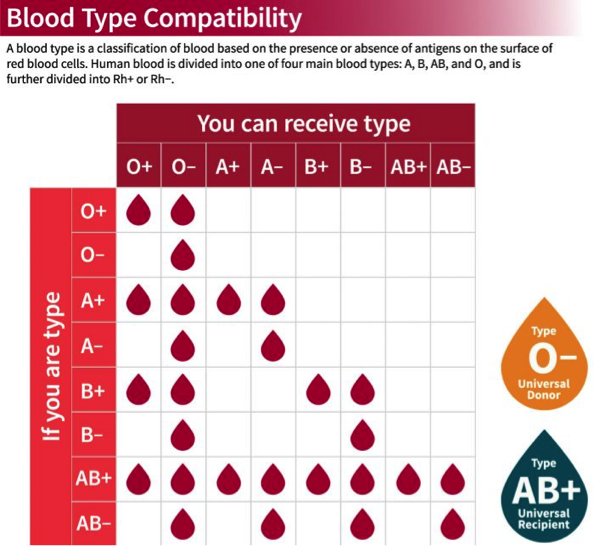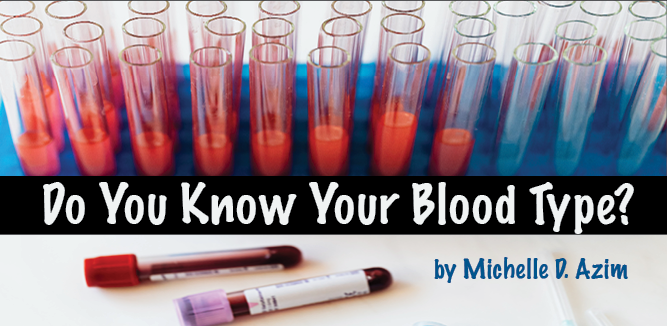Do You Know Your Blood Type?
Do You Know Your Blood Type?
by Michelle D. Azim
Have you ever looked at your veins and wondered about the vital red fluid running through them known as blood and the story it may tell you about yourself? Blood is something we all have and yet not much is discussed, taught, or even known about this essential substance that is constantly running through our veins delivering nutrients and oxygen throughout our bodies, keeping us alive. If you ask someone what their blood type is, more than likely you will hear a response of “red” or “I don’t know” or “I’m not sure, but I think I’m O+ (positive).” You are not alone if you’re one of these individuals. According to a 2019 CBS poll, only 66% of Americans were reported as knowing their blood type, which means 34% of Americans are completely in the dark about the knowledge of their own blood type. Unfortunately, many of these same people can enthusiastically and effortlessly memorize the stats of their favorite sports teams or even flawlessly rap and sing the lyrics of their favorite music artists but sadly cannot mention what their very own blood type is.
Did you know that your blood type is inherited from your parents and is determined by two major factors: the A-B-O blood grouping system and the Rh (Rhesus) factor? Your blood type falls into one of these major blood groups: A, B, AB, or O, referring to the presence or absence of these antigens on your red blood cells. For example, if you have A antigens on your red blood cells, your blood is considered type A. If there is no presence of these antigens on your red blood cells, your blood is considered type O. Along with this A-B-O blood grouping system, your blood is either Rh (Rhesus) positive with a plus sign after your blood group or Rh (Rhesus) negative with a minus sign after your blood group: A+, A-, B+, B-, AB+, AB-, O+, O-, which refers to the presence or absence of the Rhesus protein, or Rh (D) Antigen, found on the surface of your red blood cells. The term Rh (Rhesus) Factor comes from a monkey called the Rhesus Macaque which was believed to have a similar antigen found on its red blood cells. Most of the world’s population is typed as Rh positive, estimated at 85 percent; while only 15% of the world’s population is typed as Rh negative. People with O negative (O-) blood are classified as universal donors, which makes this blood type frequently used in emergency situations when there is no time to match a patient’s exact blood type. People with Type AB positive (AB+) blood are classified as universal recipients and can receive blood from anyone.

These letters with the plus+ and minus- signs for blood types can be very crucial and important in emergency situations, pregnancies, major surgical operations, blood transfusions and in other matters. Receiving blood from the wrong A-B-O blood group can create health complications and, in some cases, ultimately lead to death. Rh positive individuals can receive both Rh negative and Rh positive blood if the blood groups are compatible. However, if a Rh negative person receives Rh positive blood their bodies would try to destroy the foreign RhD antigens, a reaction that could be fatal. Rh negative individuals can only receive Rh negative blood if the blood groups are compatible. This makes Rh negative blood extremely sought after and in high demand at blood donation centers, and it is why Rh negative individuals are encouraged to donate blood as it can be received by and save the lives of both Rh positive and Rh negative patients.
For women who are Rh negative, conceiving a baby with a Rh positive man may be harmful to the fetus and bring complications to the pregnancy known as Rh Incompatibility, causing medical intervention to be needed if the fetus she is carrying is Rh positive. In the event of the Rh negative mother’s and the Rh positive baby’s blood mixing, the mother’s immune system would treat the Rh positive fetal cells as being a foreign invading substance. The mother’s body would then start to make Rh antibodies that can cross the placenta and attack and damage the baby’s red blood cells, which can lead to Rh Disease or a miscarriage. This usually isn’t a problem during her first pregnancy with a Rh positive baby since it takes a while for her body to make Rh antibodies that could affect the baby—this is known as Rh Sensitization of her immune system to protect itself. The concern is with her subsequent pregnancy/pregnancies with a Rh positive baby, since by then her blood would already have the Rh antibodies to attack the Rh positive fetal red blood cells after being Rh sensitized from her first pregnancy with a Rh positive baby. If left untreated each additional Rh positive pregnancy she has will become worse, with even more severe cases of Rh Incompatibility. Therefore, pregnant women are always given a blood test at their first prenatal visit during early pregnancy. If a woman is typed as Rh negative, she will usually be given RhoGAM, or Rho(D) Immune Globulin (Human), which protects her immune system from exposure of these possibly Rh positive fetal cells. However, if the father of the baby is also Rh negative, Rh Incompatibility is not an issue and the use of RhoGAM is not necessary since a Rh negative man and a Rh negative woman can only produce Rh negative offspring. This is a major reason why all women and men should know their blood types before having children.
Why is knowing your blood type important?
- Avoid having a transfusion with incompatible blood at a time of need
- Possibly help others in times of a blood shortage
- Could save your life and the life of others
- Prevents possible Rh Incompatibility pregnancy risks
- Know who you can donate blood to
- Know who you can receive blood from
Some ways to find out your blood type are by requesting a blood test from your doctor, by using a blood typing kit, or by donating blood. As time goes on maybe more attention will be given to the teaching and learning about this pivotal subject matter and ultimately lead all people to see the value and importance in knowing their own blood type.

